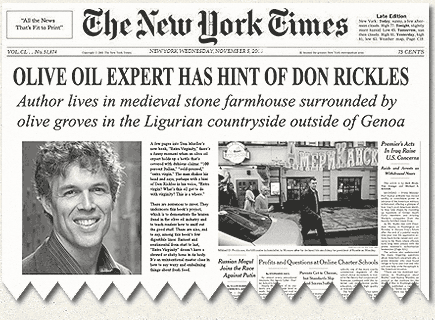A review of Tom Mueller’s book by New York Times writer Dwight Garner begins by making a caricature of one of the people Mueller profiles: “There’s a funny moment when an olive oil expert holds up a bottle that’s covered with dubious claims: ‘100 percent Italian,’ ‘cold-pressed,’ ‘extra virgin.’ ”
Garner continues: “The man shakes his head and says, perhaps with a hint of Don Rickles in his voice, ‘Extra virgin? What’s this oil got to do with virginity? This is a whore.’ ”
The man, Flavio Zaramella, is a terminally-ill Milanese businessman and expert olive oil taster who, among others profiled in the book, is working to shed light on the corrupt practices in the olive oil industry.
The leap to the American wisecrack comedian Don Rickles is a far one, but it’s one of many in the book review by Garner, who seems more concerned with stringing together a succession of one-liners himself, than considering the serious subject of food fraud.
The lengths Garner goes to find his stabs are surprising, including a critical assessment of the dust flap description of the author’s home. Mueller does indeed live in a medieval stone farmhouse surrounded by olive groves in the Ligurian countryside outside of Genoa — (not a nineteenth-century colonial modern in Frenchtown, New Jersey). But Garner calls the jacket detail “the prose equivalent of Corinthian leather.”
Out of this immensely interesting book, Garner plucks three words here, four words there, to build another quip: “One man here has a ‘hint of wonder in his voice.’ Another ‘laughed, high-pitched and merrily.’ A woman has ‘almond-shaped eyes that seem to look straight into your soul.’ This same woman has ‘a twinkle in her eye.’
Garner snaps, “it is as if we are reading about elves.”
I never felt that way, because I read those words in the context of the rich portraits of intriguing people Mueller visited around the world — instead of pulling a few snippets out for a clumsy book review.
When Garner comes around to what’s really at stake, it’s with a belittling tone of sarcasm. “The news Mr. Mueller brings about extra virgin olive oil — E.V.O.O., as Rachael Ray likes to put it — is alarming,” Garner writes (for some reason including in the sentence a hyperlink to an obscure web store that sells gift baskets but offers no clue to the identity of its owner or from where it is operated — not unlike the anonymity of adulterated olive oils). And of course, Garner knows if you ever really want to say something is alarming, you don’t let it share a sentence with Rachel Ray.
Then there’s this: “The Food and Drug Administration considers this adulteration a low priority. Grody olive oil is not killing anyone. We’re talking about a first-world problem here. Caveat emptor.” Notice the absence of a colon or commas that would help attribute each of those sentiments to the FDA. Garner conveniently omitted the colon so you don’t know where the downplay is coming from — the FDA or Garner himself.
But caveat emptor didn’t help the 800 people who died and 20,000 hospitalized from olive oil adulteration in Madrid in 1981 (and not much has changed since then). Olive oil fraud is a serious global health issue and its ongoing practice endangers the economic and cultural stability of olive oil-producing regions throughout the world — perils that are only now coming to the forefront, thanks in large part to Tom Mueller.
Garner saves the best for last, as he tosses aside thousands of years of history, culture, corruption and the dedication of producers who craft one of the world’s healthiest foods: “Where there’s a flask of olive oil, you also pray to find some vinegar.” Right. My sentiments exactly, Mr. Garner.
It would be too bad if Garner’s review, clearly constructed to be entertaining instead of a serious look at the important topics Mueller brings to light, prevented people from reading this essential book.
Book Review: Olive Oil’s Growers, Chemists, Cooks and Crooks, by Dwight Garner









